Academic Integrity in Higher Education: Importance and Implications
VerifiedAdded on 2023/06/14
|10
|2961
|349
Report
AI Summary
This report provides a comprehensive overview of academic integrity within higher education institutions, emphasizing its importance in fostering trust, honesty, and respect among students and educators. It details the significance of academic integrity in cultivating values, developing academic reputation, creating a peaceful learning environment, and promoting effective teaching and learning activities. The report also addresses the implications of academic misconduct, such as plagiarism, collusion, and cheating, and their detrimental effects on the educational environment. Furthermore, it discusses the creation of an educational game designed to teach students about plagiarism and the skills acquired during the academic year, including effective reading, communication, and teamwork. The report concludes by highlighting the role of academic integrity in developing successful leaders and promoting positive social attitudes within the academic community. Desklib provides access to this report along with a wealth of study resources.
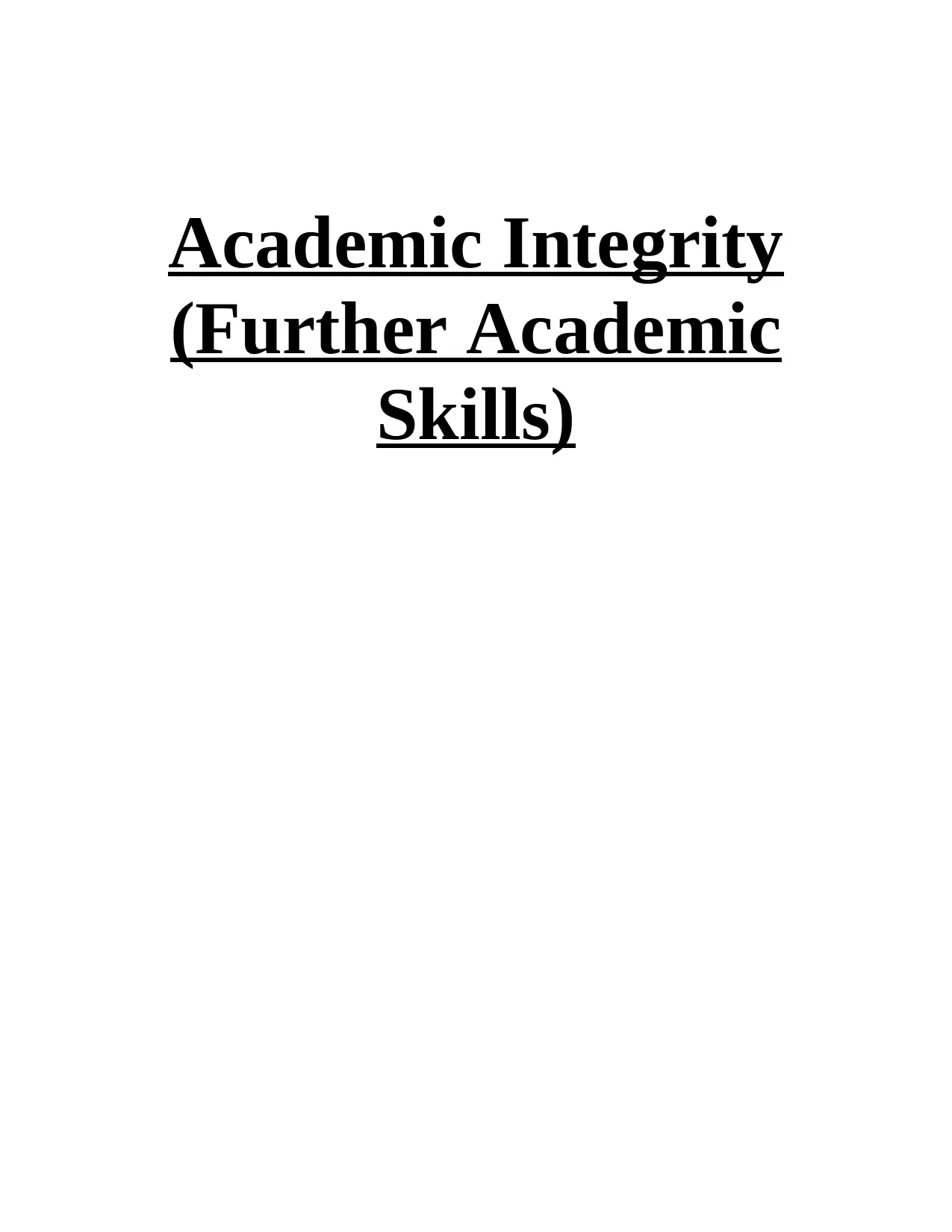
Academic Integrity
(Further Academic
Skills)
(Further Academic
Skills)
Paraphrase This Document
Need a fresh take? Get an instant paraphrase of this document with our AI Paraphraser
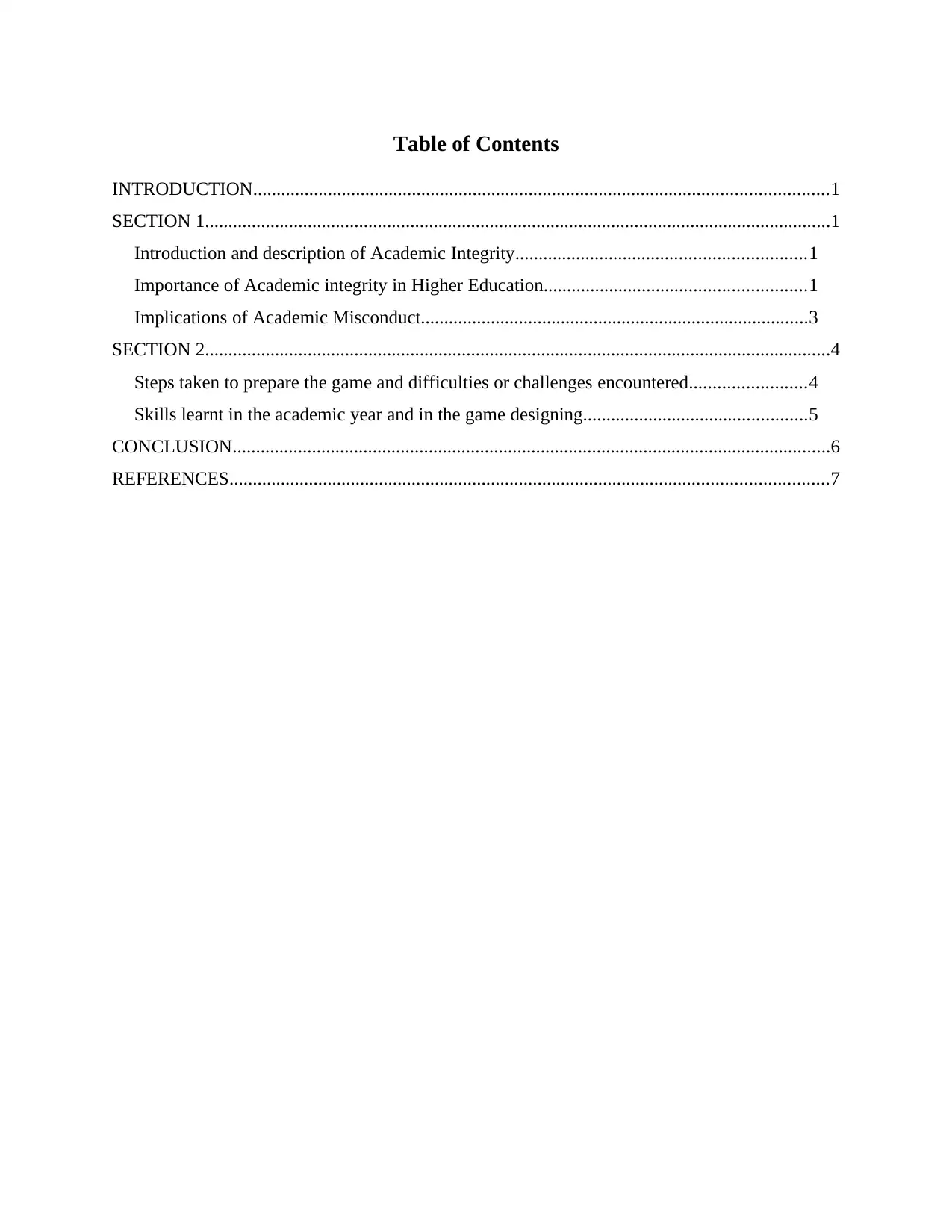
Table of Contents
INTRODUCTION...........................................................................................................................1
SECTION 1......................................................................................................................................1
Introduction and description of Academic Integrity..............................................................1
Importance of Academic integrity in Higher Education........................................................1
Implications of Academic Misconduct...................................................................................3
SECTION 2......................................................................................................................................4
Steps taken to prepare the game and difficulties or challenges encountered.........................4
Skills learnt in the academic year and in the game designing................................................5
CONCLUSION................................................................................................................................6
REFERENCES................................................................................................................................7
INTRODUCTION...........................................................................................................................1
SECTION 1......................................................................................................................................1
Introduction and description of Academic Integrity..............................................................1
Importance of Academic integrity in Higher Education........................................................1
Implications of Academic Misconduct...................................................................................3
SECTION 2......................................................................................................................................4
Steps taken to prepare the game and difficulties or challenges encountered.........................4
Skills learnt in the academic year and in the game designing................................................5
CONCLUSION................................................................................................................................6
REFERENCES................................................................................................................................7
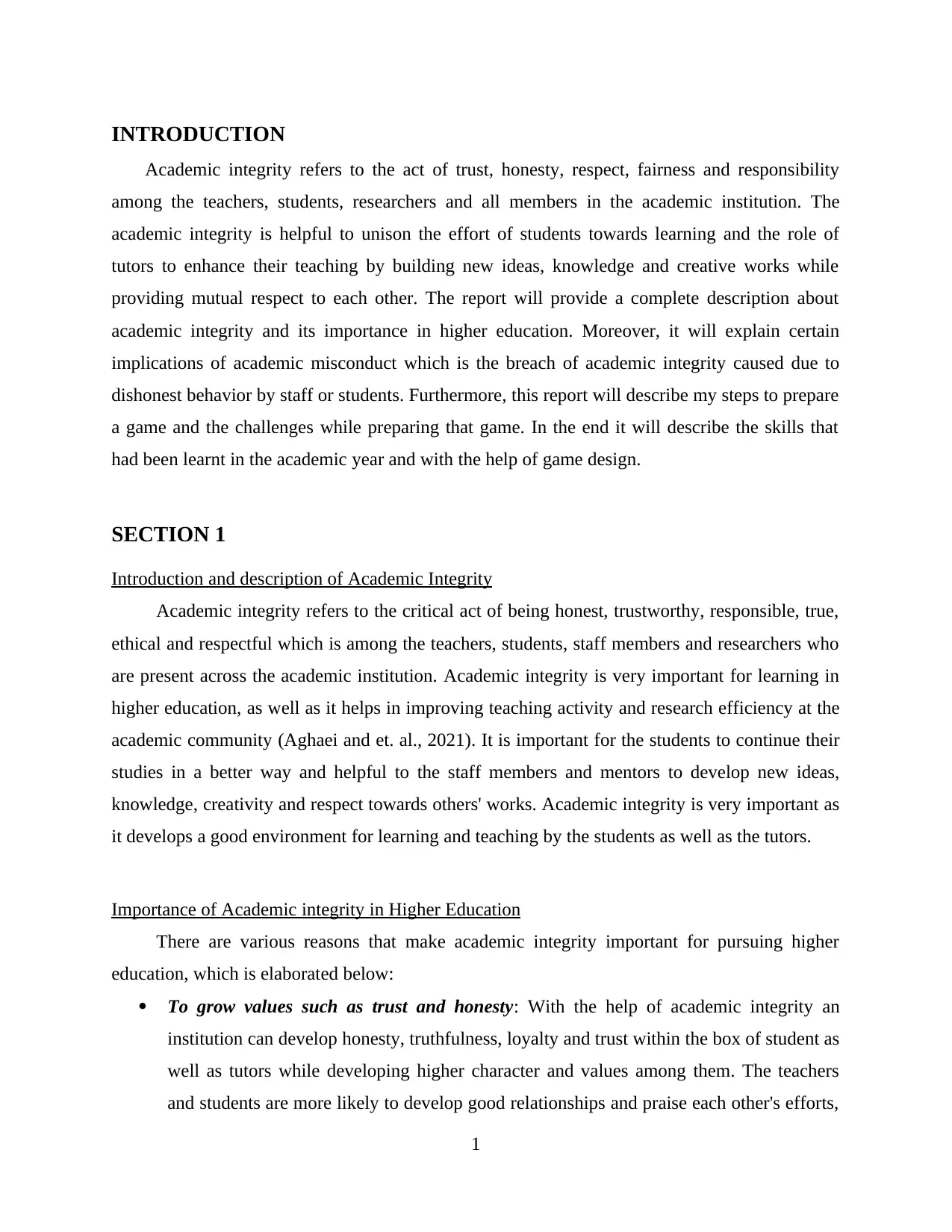
INTRODUCTION
Academic integrity refers to the act of trust, honesty, respect, fairness and responsibility
among the teachers, students, researchers and all members in the academic institution. The
academic integrity is helpful to unison the effort of students towards learning and the role of
tutors to enhance their teaching by building new ideas, knowledge and creative works while
providing mutual respect to each other. The report will provide a complete description about
academic integrity and its importance in higher education. Moreover, it will explain certain
implications of academic misconduct which is the breach of academic integrity caused due to
dishonest behavior by staff or students. Furthermore, this report will describe my steps to prepare
a game and the challenges while preparing that game. In the end it will describe the skills that
had been learnt in the academic year and with the help of game design.
SECTION 1
Introduction and description of Academic Integrity
Academic integrity refers to the critical act of being honest, trustworthy, responsible, true,
ethical and respectful which is among the teachers, students, staff members and researchers who
are present across the academic institution. Academic integrity is very important for learning in
higher education, as well as it helps in improving teaching activity and research efficiency at the
academic community (Aghaei and et. al., 2021). It is important for the students to continue their
studies in a better way and helpful to the staff members and mentors to develop new ideas,
knowledge, creativity and respect towards others' works. Academic integrity is very important as
it develops a good environment for learning and teaching by the students as well as the tutors.
Importance of Academic integrity in Higher Education
There are various reasons that make academic integrity important for pursuing higher
education, which is elaborated below:
To grow values such as trust and honesty: With the help of academic integrity an
institution can develop honesty, truthfulness, loyalty and trust within the box of student as
well as tutors while developing higher character and values among them. The teachers
and students are more likely to develop good relationships and praise each other's efforts,
1
Academic integrity refers to the act of trust, honesty, respect, fairness and responsibility
among the teachers, students, researchers and all members in the academic institution. The
academic integrity is helpful to unison the effort of students towards learning and the role of
tutors to enhance their teaching by building new ideas, knowledge and creative works while
providing mutual respect to each other. The report will provide a complete description about
academic integrity and its importance in higher education. Moreover, it will explain certain
implications of academic misconduct which is the breach of academic integrity caused due to
dishonest behavior by staff or students. Furthermore, this report will describe my steps to prepare
a game and the challenges while preparing that game. In the end it will describe the skills that
had been learnt in the academic year and with the help of game design.
SECTION 1
Introduction and description of Academic Integrity
Academic integrity refers to the critical act of being honest, trustworthy, responsible, true,
ethical and respectful which is among the teachers, students, staff members and researchers who
are present across the academic institution. Academic integrity is very important for learning in
higher education, as well as it helps in improving teaching activity and research efficiency at the
academic community (Aghaei and et. al., 2021). It is important for the students to continue their
studies in a better way and helpful to the staff members and mentors to develop new ideas,
knowledge, creativity and respect towards others' works. Academic integrity is very important as
it develops a good environment for learning and teaching by the students as well as the tutors.
Importance of Academic integrity in Higher Education
There are various reasons that make academic integrity important for pursuing higher
education, which is elaborated below:
To grow values such as trust and honesty: With the help of academic integrity an
institution can develop honesty, truthfulness, loyalty and trust within the box of student as
well as tutors while developing higher character and values among them. The teachers
and students are more likely to develop good relationships and praise each other's efforts,
1
⊘ This is a preview!⊘
Do you want full access?
Subscribe today to unlock all pages.

Trusted by 1+ million students worldwide
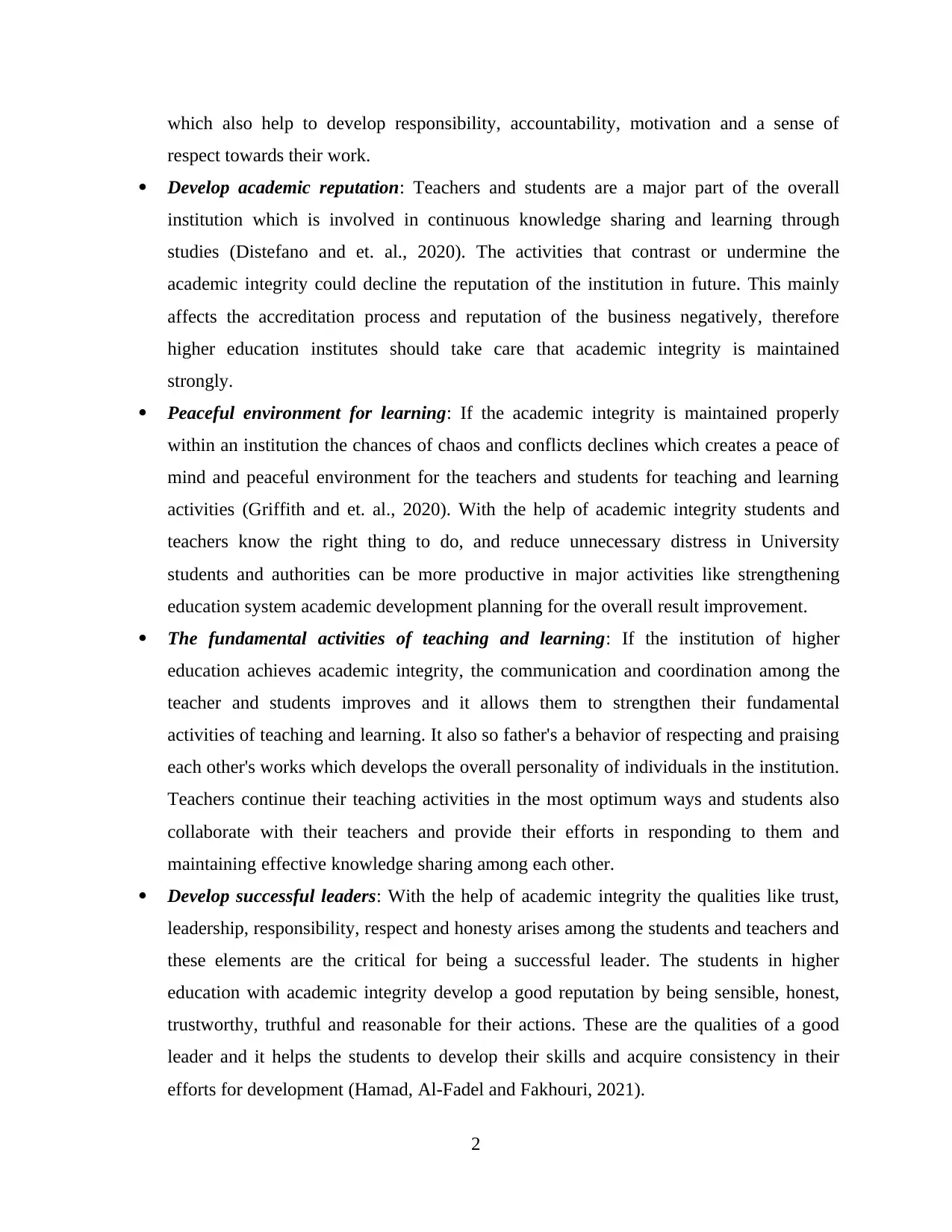
which also help to develop responsibility, accountability, motivation and a sense of
respect towards their work.
Develop academic reputation: Teachers and students are a major part of the overall
institution which is involved in continuous knowledge sharing and learning through
studies (Distefano and et. al., 2020). The activities that contrast or undermine the
academic integrity could decline the reputation of the institution in future. This mainly
affects the accreditation process and reputation of the business negatively, therefore
higher education institutes should take care that academic integrity is maintained
strongly.
Peaceful environment for learning: If the academic integrity is maintained properly
within an institution the chances of chaos and conflicts declines which creates a peace of
mind and peaceful environment for the teachers and students for teaching and learning
activities (Griffith and et. al., 2020). With the help of academic integrity students and
teachers know the right thing to do, and reduce unnecessary distress in University
students and authorities can be more productive in major activities like strengthening
education system academic development planning for the overall result improvement.
The fundamental activities of teaching and learning: If the institution of higher
education achieves academic integrity, the communication and coordination among the
teacher and students improves and it allows them to strengthen their fundamental
activities of teaching and learning. It also so father's a behavior of respecting and praising
each other's works which develops the overall personality of individuals in the institution.
Teachers continue their teaching activities in the most optimum ways and students also
collaborate with their teachers and provide their efforts in responding to them and
maintaining effective knowledge sharing among each other.
Develop successful leaders: With the help of academic integrity the qualities like trust,
leadership, responsibility, respect and honesty arises among the students and teachers and
these elements are the critical for being a successful leader. The students in higher
education with academic integrity develop a good reputation by being sensible, honest,
trustworthy, truthful and reasonable for their actions. These are the qualities of a good
leader and it helps the students to develop their skills and acquire consistency in their
efforts for development (Hamad, Al-Fadel and Fakhouri, 2021).
2
respect towards their work.
Develop academic reputation: Teachers and students are a major part of the overall
institution which is involved in continuous knowledge sharing and learning through
studies (Distefano and et. al., 2020). The activities that contrast or undermine the
academic integrity could decline the reputation of the institution in future. This mainly
affects the accreditation process and reputation of the business negatively, therefore
higher education institutes should take care that academic integrity is maintained
strongly.
Peaceful environment for learning: If the academic integrity is maintained properly
within an institution the chances of chaos and conflicts declines which creates a peace of
mind and peaceful environment for the teachers and students for teaching and learning
activities (Griffith and et. al., 2020). With the help of academic integrity students and
teachers know the right thing to do, and reduce unnecessary distress in University
students and authorities can be more productive in major activities like strengthening
education system academic development planning for the overall result improvement.
The fundamental activities of teaching and learning: If the institution of higher
education achieves academic integrity, the communication and coordination among the
teacher and students improves and it allows them to strengthen their fundamental
activities of teaching and learning. It also so father's a behavior of respecting and praising
each other's works which develops the overall personality of individuals in the institution.
Teachers continue their teaching activities in the most optimum ways and students also
collaborate with their teachers and provide their efforts in responding to them and
maintaining effective knowledge sharing among each other.
Develop successful leaders: With the help of academic integrity the qualities like trust,
leadership, responsibility, respect and honesty arises among the students and teachers and
these elements are the critical for being a successful leader. The students in higher
education with academic integrity develop a good reputation by being sensible, honest,
trustworthy, truthful and reasonable for their actions. These are the qualities of a good
leader and it helps the students to develop their skills and acquire consistency in their
efforts for development (Hamad, Al-Fadel and Fakhouri, 2021).
2
Paraphrase This Document
Need a fresh take? Get an instant paraphrase of this document with our AI Paraphraser
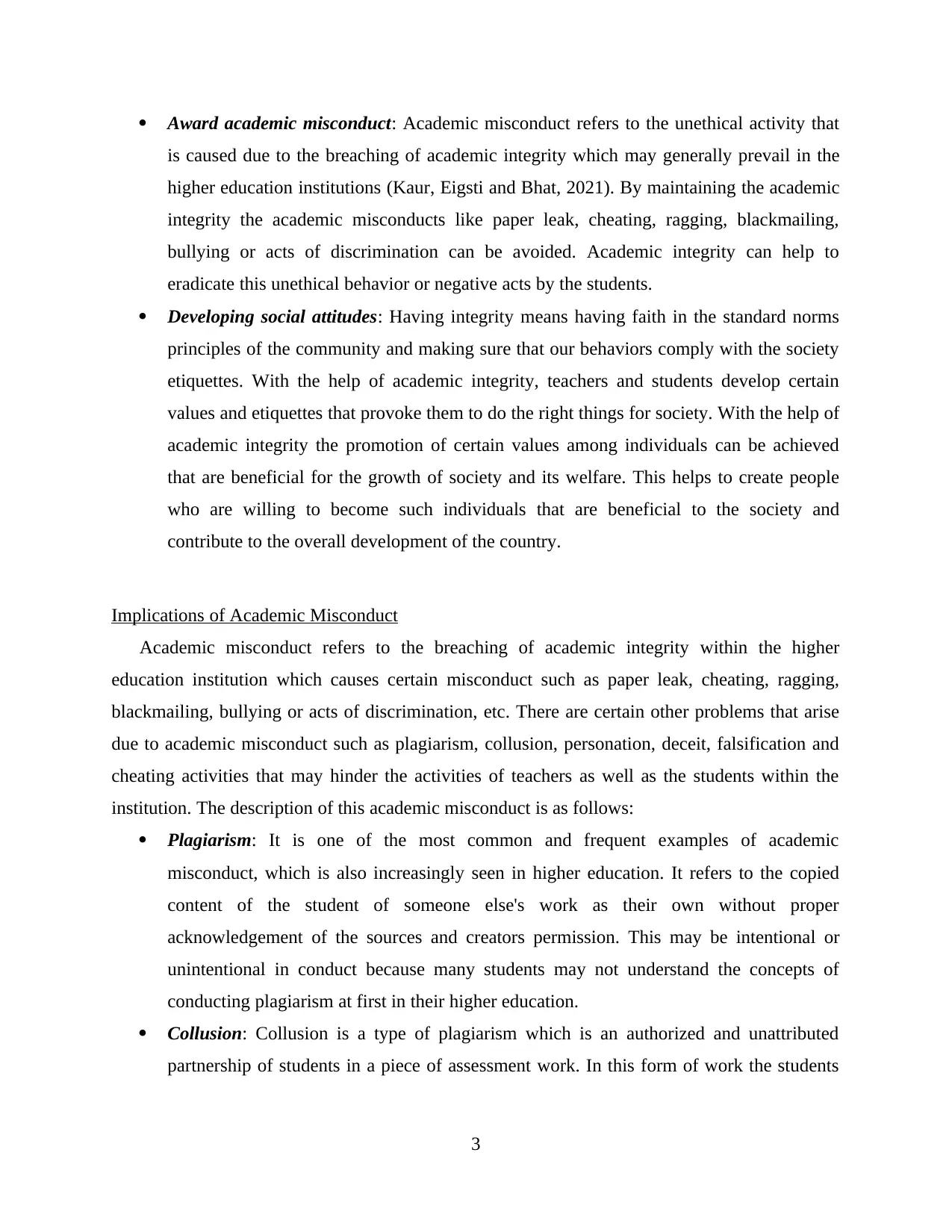
Award academic misconduct: Academic misconduct refers to the unethical activity that
is caused due to the breaching of academic integrity which may generally prevail in the
higher education institutions (Kaur, Eigsti and Bhat, 2021). By maintaining the academic
integrity the academic misconducts like paper leak, cheating, ragging, blackmailing,
bullying or acts of discrimination can be avoided. Academic integrity can help to
eradicate this unethical behavior or negative acts by the students.
Developing social attitudes: Having integrity means having faith in the standard norms
principles of the community and making sure that our behaviors comply with the society
etiquettes. With the help of academic integrity, teachers and students develop certain
values and etiquettes that provoke them to do the right things for society. With the help of
academic integrity the promotion of certain values among individuals can be achieved
that are beneficial for the growth of society and its welfare. This helps to create people
who are willing to become such individuals that are beneficial to the society and
contribute to the overall development of the country.
Implications of Academic Misconduct
Academic misconduct refers to the breaching of academic integrity within the higher
education institution which causes certain misconduct such as paper leak, cheating, ragging,
blackmailing, bullying or acts of discrimination, etc. There are certain other problems that arise
due to academic misconduct such as plagiarism, collusion, personation, deceit, falsification and
cheating activities that may hinder the activities of teachers as well as the students within the
institution. The description of this academic misconduct is as follows:
Plagiarism: It is one of the most common and frequent examples of academic
misconduct, which is also increasingly seen in higher education. It refers to the copied
content of the student of someone else's work as their own without proper
acknowledgement of the sources and creators permission. This may be intentional or
unintentional in conduct because many students may not understand the concepts of
conducting plagiarism at first in their higher education.
Collusion: Collusion is a type of plagiarism which is an authorized and unattributed
partnership of students in a piece of assessment work. In this form of work the students
3
is caused due to the breaching of academic integrity which may generally prevail in the
higher education institutions (Kaur, Eigsti and Bhat, 2021). By maintaining the academic
integrity the academic misconducts like paper leak, cheating, ragging, blackmailing,
bullying or acts of discrimination can be avoided. Academic integrity can help to
eradicate this unethical behavior or negative acts by the students.
Developing social attitudes: Having integrity means having faith in the standard norms
principles of the community and making sure that our behaviors comply with the society
etiquettes. With the help of academic integrity, teachers and students develop certain
values and etiquettes that provoke them to do the right things for society. With the help of
academic integrity the promotion of certain values among individuals can be achieved
that are beneficial for the growth of society and its welfare. This helps to create people
who are willing to become such individuals that are beneficial to the society and
contribute to the overall development of the country.
Implications of Academic Misconduct
Academic misconduct refers to the breaching of academic integrity within the higher
education institution which causes certain misconduct such as paper leak, cheating, ragging,
blackmailing, bullying or acts of discrimination, etc. There are certain other problems that arise
due to academic misconduct such as plagiarism, collusion, personation, deceit, falsification and
cheating activities that may hinder the activities of teachers as well as the students within the
institution. The description of this academic misconduct is as follows:
Plagiarism: It is one of the most common and frequent examples of academic
misconduct, which is also increasingly seen in higher education. It refers to the copied
content of the student of someone else's work as their own without proper
acknowledgement of the sources and creators permission. This may be intentional or
unintentional in conduct because many students may not understand the concepts of
conducting plagiarism at first in their higher education.
Collusion: Collusion is a type of plagiarism which is an authorized and unattributed
partnership of students in a piece of assessment work. In this form of work the students
3
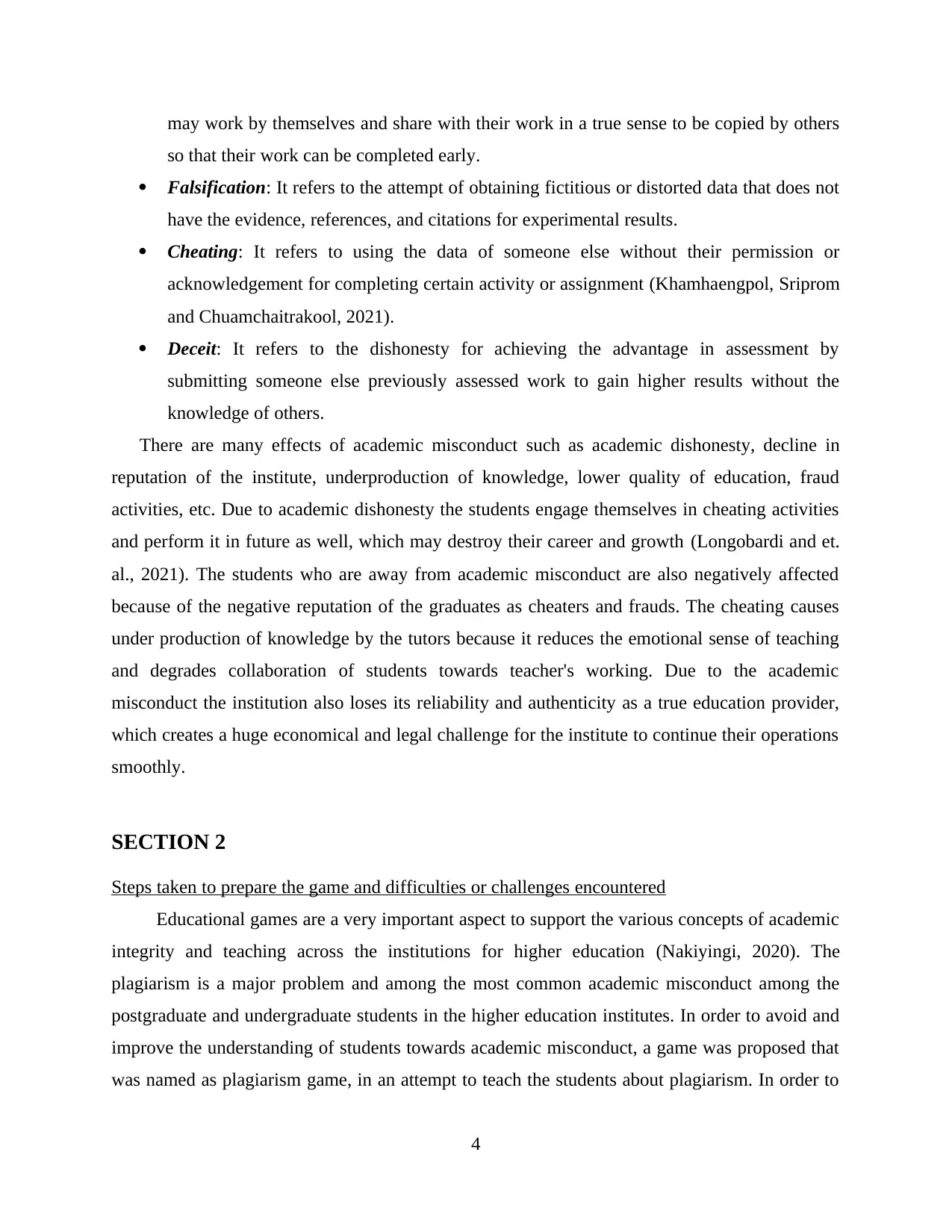
may work by themselves and share with their work in a true sense to be copied by others
so that their work can be completed early.
Falsification: It refers to the attempt of obtaining fictitious or distorted data that does not
have the evidence, references, and citations for experimental results.
Cheating: It refers to using the data of someone else without their permission or
acknowledgement for completing certain activity or assignment (Khamhaengpol, Sriprom
and Chuamchaitrakool, 2021).
Deceit: It refers to the dishonesty for achieving the advantage in assessment by
submitting someone else previously assessed work to gain higher results without the
knowledge of others.
There are many effects of academic misconduct such as academic dishonesty, decline in
reputation of the institute, underproduction of knowledge, lower quality of education, fraud
activities, etc. Due to academic dishonesty the students engage themselves in cheating activities
and perform it in future as well, which may destroy their career and growth (Longobardi and et.
al., 2021). The students who are away from academic misconduct are also negatively affected
because of the negative reputation of the graduates as cheaters and frauds. The cheating causes
under production of knowledge by the tutors because it reduces the emotional sense of teaching
and degrades collaboration of students towards teacher's working. Due to the academic
misconduct the institution also loses its reliability and authenticity as a true education provider,
which creates a huge economical and legal challenge for the institute to continue their operations
smoothly.
SECTION 2
Steps taken to prepare the game and difficulties or challenges encountered
Educational games are a very important aspect to support the various concepts of academic
integrity and teaching across the institutions for higher education (Nakiyingi, 2020). The
plagiarism is a major problem and among the most common academic misconduct among the
postgraduate and undergraduate students in the higher education institutes. In order to avoid and
improve the understanding of students towards academic misconduct, a game was proposed that
was named as plagiarism game, in an attempt to teach the students about plagiarism. In order to
4
so that their work can be completed early.
Falsification: It refers to the attempt of obtaining fictitious or distorted data that does not
have the evidence, references, and citations for experimental results.
Cheating: It refers to using the data of someone else without their permission or
acknowledgement for completing certain activity or assignment (Khamhaengpol, Sriprom
and Chuamchaitrakool, 2021).
Deceit: It refers to the dishonesty for achieving the advantage in assessment by
submitting someone else previously assessed work to gain higher results without the
knowledge of others.
There are many effects of academic misconduct such as academic dishonesty, decline in
reputation of the institute, underproduction of knowledge, lower quality of education, fraud
activities, etc. Due to academic dishonesty the students engage themselves in cheating activities
and perform it in future as well, which may destroy their career and growth (Longobardi and et.
al., 2021). The students who are away from academic misconduct are also negatively affected
because of the negative reputation of the graduates as cheaters and frauds. The cheating causes
under production of knowledge by the tutors because it reduces the emotional sense of teaching
and degrades collaboration of students towards teacher's working. Due to the academic
misconduct the institution also loses its reliability and authenticity as a true education provider,
which creates a huge economical and legal challenge for the institute to continue their operations
smoothly.
SECTION 2
Steps taken to prepare the game and difficulties or challenges encountered
Educational games are a very important aspect to support the various concepts of academic
integrity and teaching across the institutions for higher education (Nakiyingi, 2020). The
plagiarism is a major problem and among the most common academic misconduct among the
postgraduate and undergraduate students in the higher education institutes. In order to avoid and
improve the understanding of students towards academic misconduct, a game was proposed that
was named as plagiarism game, in an attempt to teach the students about plagiarism. In order to
4
⊘ This is a preview!⊘
Do you want full access?
Subscribe today to unlock all pages.

Trusted by 1+ million students worldwide
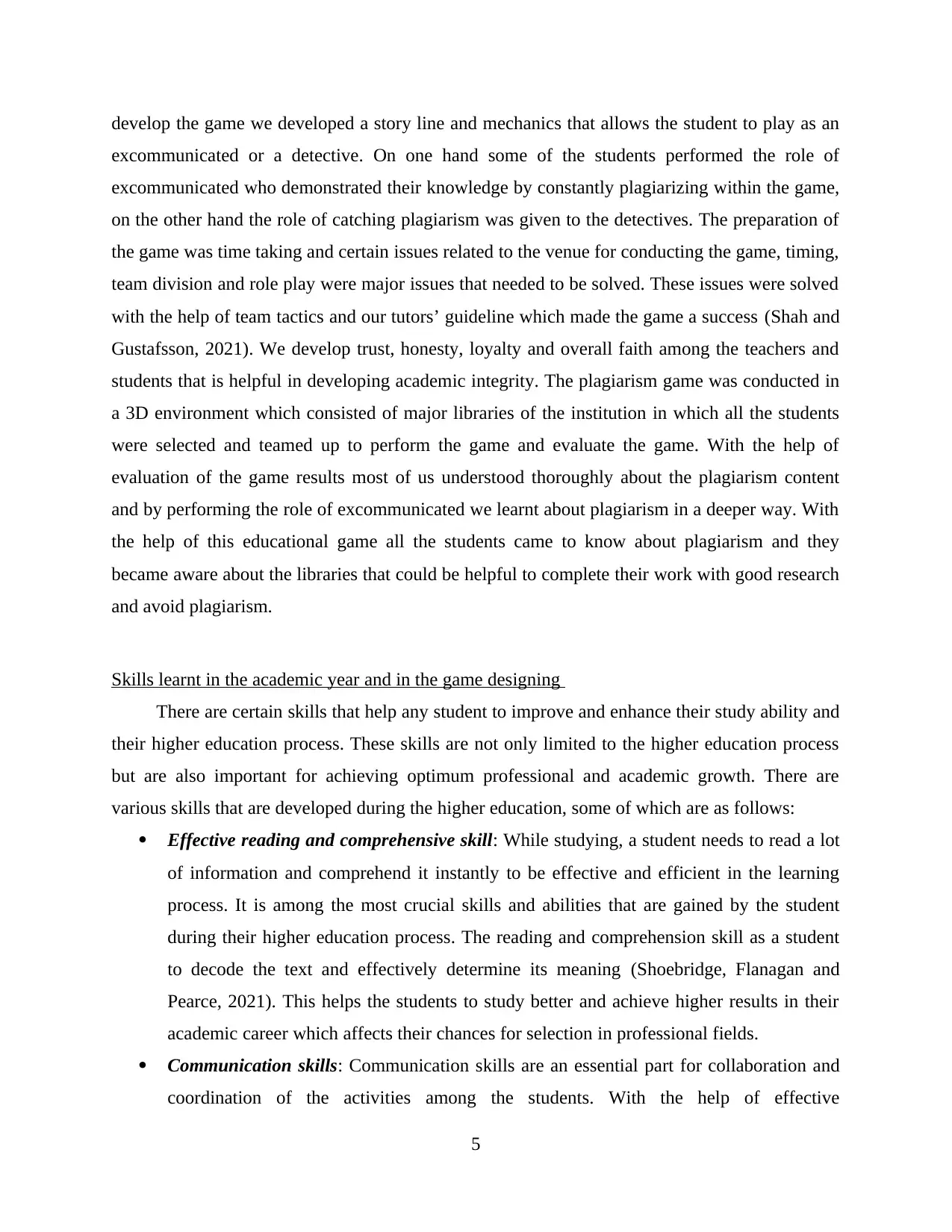
develop the game we developed a story line and mechanics that allows the student to play as an
excommunicated or a detective. On one hand some of the students performed the role of
excommunicated who demonstrated their knowledge by constantly plagiarizing within the game,
on the other hand the role of catching plagiarism was given to the detectives. The preparation of
the game was time taking and certain issues related to the venue for conducting the game, timing,
team division and role play were major issues that needed to be solved. These issues were solved
with the help of team tactics and our tutors’ guideline which made the game a success (Shah and
Gustafsson, 2021). We develop trust, honesty, loyalty and overall faith among the teachers and
students that is helpful in developing academic integrity. The plagiarism game was conducted in
a 3D environment which consisted of major libraries of the institution in which all the students
were selected and teamed up to perform the game and evaluate the game. With the help of
evaluation of the game results most of us understood thoroughly about the plagiarism content
and by performing the role of excommunicated we learnt about plagiarism in a deeper way. With
the help of this educational game all the students came to know about plagiarism and they
became aware about the libraries that could be helpful to complete their work with good research
and avoid plagiarism.
Skills learnt in the academic year and in the game designing
There are certain skills that help any student to improve and enhance their study ability and
their higher education process. These skills are not only limited to the higher education process
but are also important for achieving optimum professional and academic growth. There are
various skills that are developed during the higher education, some of which are as follows:
Effective reading and comprehensive skill: While studying, a student needs to read a lot
of information and comprehend it instantly to be effective and efficient in the learning
process. It is among the most crucial skills and abilities that are gained by the student
during their higher education process. The reading and comprehension skill as a student
to decode the text and effectively determine its meaning (Shoebridge, Flanagan and
Pearce, 2021). This helps the students to study better and achieve higher results in their
academic career which affects their chances for selection in professional fields.
Communication skills: Communication skills are an essential part for collaboration and
coordination of the activities among the students. With the help of effective
5
excommunicated or a detective. On one hand some of the students performed the role of
excommunicated who demonstrated their knowledge by constantly plagiarizing within the game,
on the other hand the role of catching plagiarism was given to the detectives. The preparation of
the game was time taking and certain issues related to the venue for conducting the game, timing,
team division and role play were major issues that needed to be solved. These issues were solved
with the help of team tactics and our tutors’ guideline which made the game a success (Shah and
Gustafsson, 2021). We develop trust, honesty, loyalty and overall faith among the teachers and
students that is helpful in developing academic integrity. The plagiarism game was conducted in
a 3D environment which consisted of major libraries of the institution in which all the students
were selected and teamed up to perform the game and evaluate the game. With the help of
evaluation of the game results most of us understood thoroughly about the plagiarism content
and by performing the role of excommunicated we learnt about plagiarism in a deeper way. With
the help of this educational game all the students came to know about plagiarism and they
became aware about the libraries that could be helpful to complete their work with good research
and avoid plagiarism.
Skills learnt in the academic year and in the game designing
There are certain skills that help any student to improve and enhance their study ability and
their higher education process. These skills are not only limited to the higher education process
but are also important for achieving optimum professional and academic growth. There are
various skills that are developed during the higher education, some of which are as follows:
Effective reading and comprehensive skill: While studying, a student needs to read a lot
of information and comprehend it instantly to be effective and efficient in the learning
process. It is among the most crucial skills and abilities that are gained by the student
during their higher education process. The reading and comprehension skill as a student
to decode the text and effectively determine its meaning (Shoebridge, Flanagan and
Pearce, 2021). This helps the students to study better and achieve higher results in their
academic career which affects their chances for selection in professional fields.
Communication skills: Communication skills are an essential part for collaboration and
coordination of the activities among the students. With the help of effective
5
Paraphrase This Document
Need a fresh take? Get an instant paraphrase of this document with our AI Paraphraser
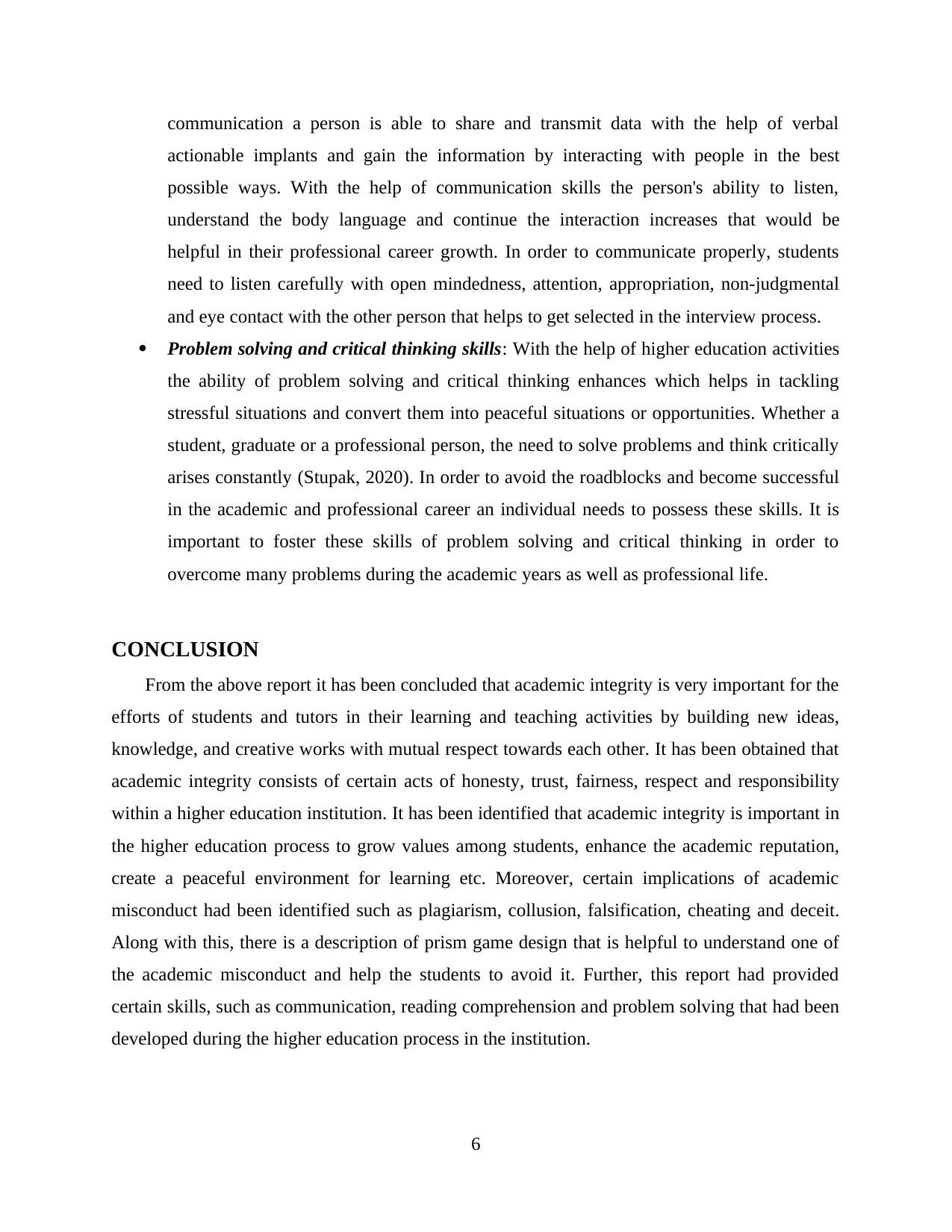
communication a person is able to share and transmit data with the help of verbal
actionable implants and gain the information by interacting with people in the best
possible ways. With the help of communication skills the person's ability to listen,
understand the body language and continue the interaction increases that would be
helpful in their professional career growth. In order to communicate properly, students
need to listen carefully with open mindedness, attention, appropriation, non-judgmental
and eye contact with the other person that helps to get selected in the interview process.
Problem solving and critical thinking skills: With the help of higher education activities
the ability of problem solving and critical thinking enhances which helps in tackling
stressful situations and convert them into peaceful situations or opportunities. Whether a
student, graduate or a professional person, the need to solve problems and think critically
arises constantly (Stupak, 2020). In order to avoid the roadblocks and become successful
in the academic and professional career an individual needs to possess these skills. It is
important to foster these skills of problem solving and critical thinking in order to
overcome many problems during the academic years as well as professional life.
CONCLUSION
From the above report it has been concluded that academic integrity is very important for the
efforts of students and tutors in their learning and teaching activities by building new ideas,
knowledge, and creative works with mutual respect towards each other. It has been obtained that
academic integrity consists of certain acts of honesty, trust, fairness, respect and responsibility
within a higher education institution. It has been identified that academic integrity is important in
the higher education process to grow values among students, enhance the academic reputation,
create a peaceful environment for learning etc. Moreover, certain implications of academic
misconduct had been identified such as plagiarism, collusion, falsification, cheating and deceit.
Along with this, there is a description of prism game design that is helpful to understand one of
the academic misconduct and help the students to avoid it. Further, this report had provided
certain skills, such as communication, reading comprehension and problem solving that had been
developed during the higher education process in the institution.
6
actionable implants and gain the information by interacting with people in the best
possible ways. With the help of communication skills the person's ability to listen,
understand the body language and continue the interaction increases that would be
helpful in their professional career growth. In order to communicate properly, students
need to listen carefully with open mindedness, attention, appropriation, non-judgmental
and eye contact with the other person that helps to get selected in the interview process.
Problem solving and critical thinking skills: With the help of higher education activities
the ability of problem solving and critical thinking enhances which helps in tackling
stressful situations and convert them into peaceful situations or opportunities. Whether a
student, graduate or a professional person, the need to solve problems and think critically
arises constantly (Stupak, 2020). In order to avoid the roadblocks and become successful
in the academic and professional career an individual needs to possess these skills. It is
important to foster these skills of problem solving and critical thinking in order to
overcome many problems during the academic years as well as professional life.
CONCLUSION
From the above report it has been concluded that academic integrity is very important for the
efforts of students and tutors in their learning and teaching activities by building new ideas,
knowledge, and creative works with mutual respect towards each other. It has been obtained that
academic integrity consists of certain acts of honesty, trust, fairness, respect and responsibility
within a higher education institution. It has been identified that academic integrity is important in
the higher education process to grow values among students, enhance the academic reputation,
create a peaceful environment for learning etc. Moreover, certain implications of academic
misconduct had been identified such as plagiarism, collusion, falsification, cheating and deceit.
Along with this, there is a description of prism game design that is helpful to understand one of
the academic misconduct and help the students to avoid it. Further, this report had provided
certain skills, such as communication, reading comprehension and problem solving that had been
developed during the higher education process in the institution.
6
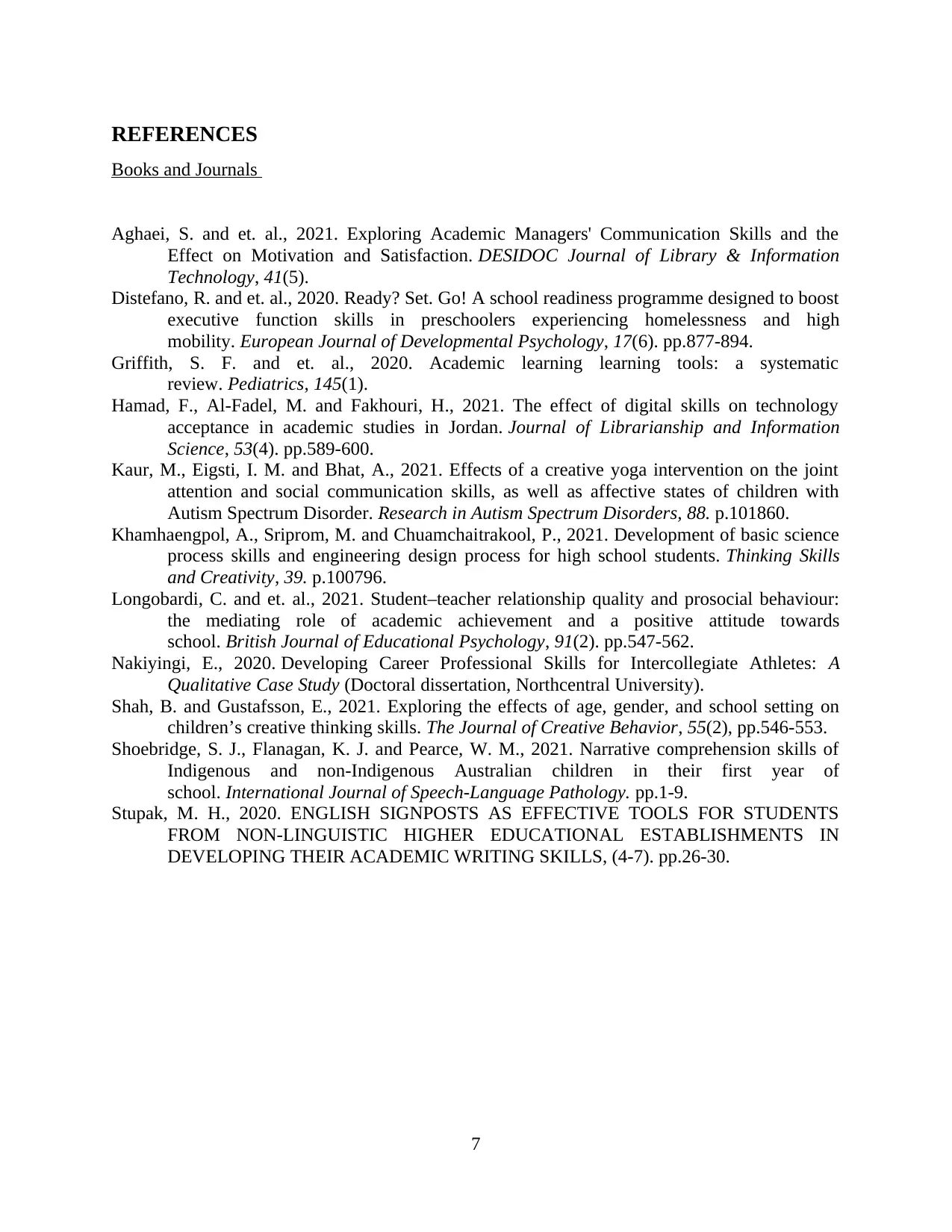
REFERENCES
Books and Journals
Aghaei, S. and et. al., 2021. Exploring Academic Managers' Communication Skills and the
Effect on Motivation and Satisfaction. DESIDOC Journal of Library & Information
Technology, 41(5).
Distefano, R. and et. al., 2020. Ready? Set. Go! A school readiness programme designed to boost
executive function skills in preschoolers experiencing homelessness and high
mobility. European Journal of Developmental Psychology, 17(6). pp.877-894.
Griffith, S. F. and et. al., 2020. Academic learning learning tools: a systematic
review. Pediatrics, 145(1).
Hamad, F., Al-Fadel, M. and Fakhouri, H., 2021. The effect of digital skills on technology
acceptance in academic studies in Jordan. Journal of Librarianship and Information
Science, 53(4). pp.589-600.
Kaur, M., Eigsti, I. M. and Bhat, A., 2021. Effects of a creative yoga intervention on the joint
attention and social communication skills, as well as affective states of children with
Autism Spectrum Disorder. Research in Autism Spectrum Disorders, 88. p.101860.
Khamhaengpol, A., Sriprom, M. and Chuamchaitrakool, P., 2021. Development of basic science
process skills and engineering design process for high school students. Thinking Skills
and Creativity, 39. p.100796.
Longobardi, C. and et. al., 2021. Student–teacher relationship quality and prosocial behaviour:
the mediating role of academic achievement and a positive attitude towards
school. British Journal of Educational Psychology, 91(2). pp.547-562.
Nakiyingi, E., 2020. Developing Career Professional Skills for Intercollegiate Athletes: A
Qualitative Case Study (Doctoral dissertation, Northcentral University).
Shah, B. and Gustafsson, E., 2021. Exploring the effects of age, gender, and school setting on
children’s creative thinking skills. The Journal of Creative Behavior, 55(2), pp.546-553.
Shoebridge, S. J., Flanagan, K. J. and Pearce, W. M., 2021. Narrative comprehension skills of
Indigenous and non-Indigenous Australian children in their first year of
school. International Journal of Speech-Language Pathology. pp.1-9.
Stupak, M. H., 2020. ENGLISH SIGNPOSTS AS EFFECTIVE TOOLS FOR STUDENTS
FROM NON-LINGUISTIC HIGHER EDUCATIONAL ESTABLISHMENTS IN
DEVELOPING THEIR ACADEMIC WRITING SKILLS, (4-7). pp.26-30.
7
Books and Journals
Aghaei, S. and et. al., 2021. Exploring Academic Managers' Communication Skills and the
Effect on Motivation and Satisfaction. DESIDOC Journal of Library & Information
Technology, 41(5).
Distefano, R. and et. al., 2020. Ready? Set. Go! A school readiness programme designed to boost
executive function skills in preschoolers experiencing homelessness and high
mobility. European Journal of Developmental Psychology, 17(6). pp.877-894.
Griffith, S. F. and et. al., 2020. Academic learning learning tools: a systematic
review. Pediatrics, 145(1).
Hamad, F., Al-Fadel, M. and Fakhouri, H., 2021. The effect of digital skills on technology
acceptance in academic studies in Jordan. Journal of Librarianship and Information
Science, 53(4). pp.589-600.
Kaur, M., Eigsti, I. M. and Bhat, A., 2021. Effects of a creative yoga intervention on the joint
attention and social communication skills, as well as affective states of children with
Autism Spectrum Disorder. Research in Autism Spectrum Disorders, 88. p.101860.
Khamhaengpol, A., Sriprom, M. and Chuamchaitrakool, P., 2021. Development of basic science
process skills and engineering design process for high school students. Thinking Skills
and Creativity, 39. p.100796.
Longobardi, C. and et. al., 2021. Student–teacher relationship quality and prosocial behaviour:
the mediating role of academic achievement and a positive attitude towards
school. British Journal of Educational Psychology, 91(2). pp.547-562.
Nakiyingi, E., 2020. Developing Career Professional Skills for Intercollegiate Athletes: A
Qualitative Case Study (Doctoral dissertation, Northcentral University).
Shah, B. and Gustafsson, E., 2021. Exploring the effects of age, gender, and school setting on
children’s creative thinking skills. The Journal of Creative Behavior, 55(2), pp.546-553.
Shoebridge, S. J., Flanagan, K. J. and Pearce, W. M., 2021. Narrative comprehension skills of
Indigenous and non-Indigenous Australian children in their first year of
school. International Journal of Speech-Language Pathology. pp.1-9.
Stupak, M. H., 2020. ENGLISH SIGNPOSTS AS EFFECTIVE TOOLS FOR STUDENTS
FROM NON-LINGUISTIC HIGHER EDUCATIONAL ESTABLISHMENTS IN
DEVELOPING THEIR ACADEMIC WRITING SKILLS, (4-7). pp.26-30.
7
⊘ This is a preview!⊘
Do you want full access?
Subscribe today to unlock all pages.

Trusted by 1+ million students worldwide

8
1 out of 10
Related Documents
Your All-in-One AI-Powered Toolkit for Academic Success.
+13062052269
info@desklib.com
Available 24*7 on WhatsApp / Email
![[object Object]](/_next/static/media/star-bottom.7253800d.svg)
Unlock your academic potential
Copyright © 2020–2026 A2Z Services. All Rights Reserved. Developed and managed by ZUCOL.

